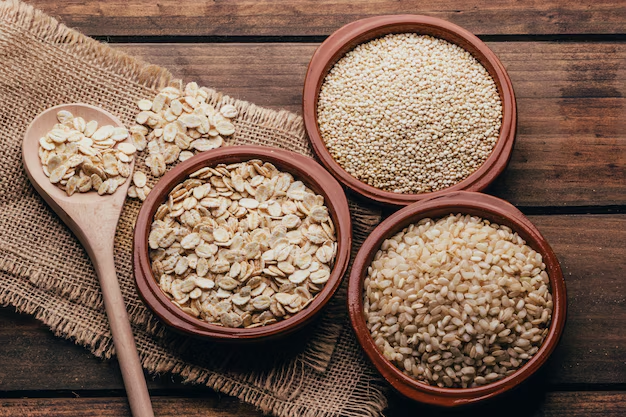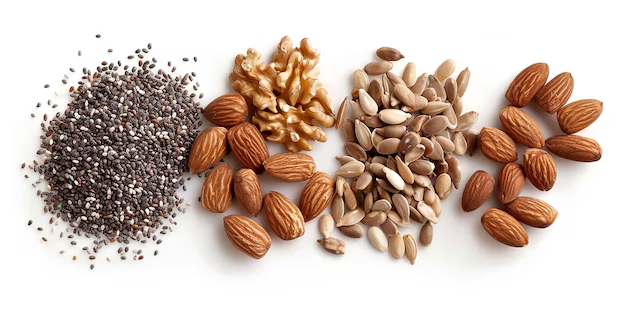Whole foods are natural foods that have been processed as little as possible. They do not contain artificial ingredients, preservatives, or added sugars. Examples of whole foods include fresh fruits, vegetables, whole grains, nuts, seeds, and lean proteins. These foods remain close to their original form, which helps keep their nutrients intact.
Choosing whole foods as part of your daily meals can offer many health benefits. They are rich in vitamins, minerals, fiber, and antioxidants that support your overall well-being. Whole foods can improve digestion by promoting a healthy gut and helping the body absorb nutrients better. Their fiber content also helps regulate blood sugar and keeps you feeling full longer.
Eating more whole foods can also lead to higher energy levels and a lower risk of long-term health issues such as heart disease, obesity, and diabetes. Making small changes like adding more fruits or replacing refined grains with whole grains can make a big difference.
🌿 Top Whole Foods to Include in Your Diet
Leafy Greens (Spinach, Kale, Swiss Chard)

Leafy greens such as spinach, kale, and Swiss chard are some of the most nutrient-dense whole foods available. They are excellent sources of essential vitamins including A, C, and K, as well as several B vitamins. These nutrients play key roles in supporting immune function, skin health, and bone strength. Leafy greens are also abundant in minerals like calcium and iron, which are important for healthy blood and strong bones.
In addition to their vitamin and mineral content, leafy greens are high in fiber, a nutrient that aids digestion and helps maintain a healthy gut. Fiber also promotes satiety, making leafy greens beneficial for those trying to manage their weight. Including these whole foods in your daily meals can greatly improve your overall health and help prevent chronic diseases.
Berries (Blueberries, Strawberries, Raspberries)
Berries such as blueberries, strawberries, and raspberries are powerful whole foods known for their rich antioxidant content. These fruits contain high levels of flavonoids, which help reduce oxidative stress and inflammation in the body. Antioxidants found in berries also support cellular health and protect against damage caused by free radicals.
Berries are not only tasty and sweet but also packed with vitamin C and dietary fiber. These nutrients support the immune system and improve skin health, while the fiber aids digestion and regulates blood sugar. Eating a variety of berries regularly can contribute to better heart health and cognitive function, making them a smart addition to any whole foods-based diet.
Whole Grains (Oats, Quinoa, Brown Rice)

Whole grains like oats, quinoa, and brown rice retain all parts of the grain — the bran, germ, and endosperm — which means they provide more nutrients than refined grains. These whole foods are rich in fiber, B vitamins, iron, and magnesium. Consuming whole grains supports steady energy release and helps maintain stable blood sugar levels throughout the day.
Including whole grains in your meals can also help lower cholesterol and improve digestive health due to their high fiber content. They keep you feeling full longer, which can aid in weight management. As foundational elements of a whole foods diet, whole grains offer both nourishment and satisfaction.
Legumes (Chickpeas, Lentils, Black Beans)
Legumes such as chickpeas, lentils, and black beans are highly nutritious whole foods that serve as excellent plant-based protein sources. They are rich in complex carbohydrates and fiber, making them ideal for promoting sustained energy levels and digestive balance. Legumes also contain a variety of essential vitamins and minerals.
These whole foods help regulate blood sugar levels and support heart health by lowering cholesterol. Due to their fiber and protein content, legumes help you feel full and satisfied, which can be helpful in managing body weight. Regularly consuming legumes is a smart and nutritious way to support overall wellness.
Nuts and Seeds (Almonds, Walnuts, Chia Seeds, Flaxseeds)

Nuts and seeds, including almonds, walnuts, chia seeds, and flaxseeds, are nutrient-dense whole foods that offer a wealth of health benefits. They are packed with healthy fats, particularly omega-3 fatty acids, which are known to support heart and brain health. These foods also contain important nutrients like vitamin E, magnesium, and antioxidants.
Eating a variety of nuts and seeds can help reduce inflammation and improve cholesterol levels. Their high protein and fiber content makes them a satisfying snack or meal addition. Incorporating nuts and seeds into a whole foods diet can greatly enhance your daily nutrient intake and promote long-term health.
Fruits (Apples, Oranges, Bananas)
Fruits like apples, oranges, and bananas are classic examples of whole foods that offer natural sweetness and a wide range of essential nutrients. These fruits provide important vitamins such as C and A, along with potassium and antioxidants that support various body functions. They also contain natural sugars, which provide energy in a healthy and balanced way.
The fiber in whole fruits supports digestive health and helps regulate blood sugar levels. Fruits also contribute to better skin and immune health. Including a colorful variety of fruits in your daily diet is a delicious and nutritious way to enjoy the benefits of whole foods.
Vegetables (Broccoli, Carrots, Bell Peppers)

Vegetables such as broccoli, carrots, and bell peppers are excellent whole foods that offer a rich supply of vitamins, minerals, and dietary fiber. These vegetables are low in calories but high in nutrients, making them ideal for supporting immune function, bone strength, and skin health.
Eating a diverse range of vegetables helps ensure that you receive a broad spectrum of nutrients. The fiber found in these whole foods also promotes digestive well-being and keeps you feeling full. A colorful plate filled with different vegetables is a simple way to boost your daily intake of essential nutrients.
Tubers (Sweet Potatoes, Yams)
Tubers like sweet potatoes and yams are satisfying and nutritious whole foods. They provide complex carbohydrates that help sustain energy levels throughout the day. These starchy vegetables are also high in fiber, which supports digestive health and helps regulate blood sugar.
Sweet potatoes and yams are rich in vitamins A and C, which boost immune function and promote healthy skin. Their natural sweetness and versatility make them a delicious and nourishing addition to a balanced whole foods diet.
Lean Proteins (Chicken, Turkey, Tofu)

Lean proteins such as chicken, turkey, and tofu are essential whole foods for building and repairing muscle. These foods supply necessary amino acids the body needs for growth and maintenance. Compared to red meats, lean proteins are lower in saturated fats, which supports heart and metabolic health.
Including lean proteins in your meals can help balance blood sugar and keep you feeling full and energized. They play a key role in a whole foods diet by offering high-quality protein without unnecessary additives or excess fat.
Healthy Fats (Olive Oil, Avocados, Fatty Fish)
Healthy fats from sources like olive oil, avocados, and fatty fish are important whole foods that support brain function and hormone health. These foods contain monounsaturated and polyunsaturated fats, which help reduce inflammation and improve heart health.
They also assist in the absorption of fat-soluble vitamins such as A, D, E, and K. Including healthy fats in your meals as part of a whole foods approach can enhance flavor, provide satiety, and support long-term wellness.
🧠 Health Benefits of Whole Foods
Improved Digestion
Whole foods play a vital role in maintaining a healthy digestive system due to their high content of natural dietary fiber. Fiber adds bulk to the stool, making it easier to pass and promoting regular bowel movements. This reduces the risk of constipation, bloating, and other digestive discomforts. Whole foods such as fruits, vegetables, legumes, and whole grains help the digestive tract function smoothly and effectively.
In addition to supporting bowel regularity, whole foods help nourish the beneficial bacteria that live in the gut. These microbes form the gut microbiome, which plays a key role in digestion, immunity, and nutrient absorption. A healthy gut environment, supported by the consistent intake of fiber-rich whole foods, leads to stronger immunity and better use of nutrients from the food we eat.
Heart Health
Whole foods like fresh fruits, green vegetables, whole grains, and fatty fish are naturally rich in nutrients that protect the heart. They contain omega-3 fatty acids, dietary fiber, and powerful antioxidants that help reduce inflammation, lower bad cholesterol, and support smooth blood flow. These nutrients work together to reduce strain on the cardiovascular system and improve overall heart function.
By replacing highly processed foods with whole foods, people can make meaningful improvements to their heart health. Regular intake of these foods may lower blood pressure, reduce the risk of artery blockages, and improve circulation. Choosing whole foods is a heart-friendly habit that supports long-term wellness and lowers the chance of developing heart disease.
Weight Management
Whole foods are naturally lower in empty calories and higher in essential nutrients compared to processed foods. They offer better nutritional value without unnecessary fats, sugars, or additives. Eating whole foods helps control hunger and cravings because they provide a steady release of energy and fewer blood sugar spikes.
The fiber and protein found in whole foods help you feel full for longer periods, reducing the temptation to overeat. This helps support healthy weight management by promoting mindful eating and reducing the intake of high-calorie snacks. Making whole foods the foundation of your diet can lead to sustainable, long-term weight control.

Enhanced Immune Function
Whole foods supply the body with powerful immune-boosting nutrients such as vitamin C, vitamin E, zinc, and antioxidants. These nutrients strengthen the immune system by supporting the production and activity of immune cells. For example, vitamin C, found in foods like citrus fruits and bell peppers, helps protect the body from infections and promotes faster healing.
Vitamin E, present in nuts, seeds, and leafy greens, acts as a strong antioxidant that defends cells from damage and reduces inflammation. Zinc, found in legumes and seafood, plays a critical role in activating and supporting immune cells. Whole foods deliver these nutrients in their natural form, making them more effective at helping the body defend itself against illness.
Reduced Risk of Chronic Diseases
A diet focused on whole foods can greatly reduce the likelihood of developing serious health problems like heart disease, type 2 diabetes, and some cancers. Whole foods are free from harmful additives and are naturally low in added sugars, sodium, and unhealthy fats — all of which are linked to chronic illnesses when consumed excessively.
Additionally, the antioxidants and fiber found in whole foods help protect the body from inflammation and oxidative stress, two major contributors to long-term disease. These protective effects help the body maintain healthy systems, reduce internal damage, and strengthen resistance to chronic health conditions over time.
Mental Health and Cognitive Function
What we eat affects not only our body but also our mental state. Whole foods such as berries, leafy greens, fatty fish, and whole grains contain essential nutrients that promote mental clarity, reduce symptoms of anxiety, and lower the risk of depression. These nutrients include omega-3 fatty acids, B vitamins, and antioxidants, all of which support brain structure and chemical balance.
A whole foods diet nourishes the brain with steady energy and helps protect against cognitive decline as we age. Regular consumption of whole foods helps improve focus, memory, and mood. Prioritizing whole foods in your meals is a natural way to support both emotional balance and long-term brain health.
🌍 Environmental Benefits of Whole Foods
Including whole foods into your daily meals offers more than just health advantages—it also contributes to a healthier planet. Whole foods are minimally processed and typically do not require heavy packaging, which means less energy is used during production. This helps reduce industrial waste and lowers the impact on natural resources.
By choosing whole foods, especially those that are grown locally and in season, you help promote sustainable agriculture. Local farming methods often use fewer chemicals and prioritize soil health, which benefits both the environment and the food you eat. Seasonal whole foods also tend to be fresher and more nutrient-rich.
Reducing your dependence on highly processed foods and instead focusing on whole foods can lower the carbon footprint tied to food transportation and manufacturing. Making these small changes in your eating habits not only improves personal wellness but also supports a more sustainable and eco-friendly food system.
🛒 Tips for Including Whole Foods into Your Diet
Shop the Perimeter: Grocery stores often place whole foods like fruits, vegetables, and meats around the perimeter of the store. Focusing your shopping in these areas can help you select more whole foods.
Buy in Bulk: Purchasing whole grains, nuts, and seeds in bulk can be more cost-effective and reduce packaging waste.
Plan Your Meals: Planning meals around whole foods can help you make healthier choices and reduce the temptation to purchase processed foods.
Cook at Home: Preparing meals at home allows you to control the ingredients and avoid hidden additives and preservatives found in many processed foods.
Read Labels: When purchasing packaged foods, read labels carefully to ensure that the product is made with whole ingredients and does not contain artificial additives.
🧾 Sample Whole Foods Meal Plan
| Meal | Menu |
|---|---|
| Breakfast | Oatmeal topped with fresh berries, chia seeds, and a drizzle of honey |
| Lunch | Quinoa salad with mixed greens, chickpeas, cucumbers, tomatoes, and olive oil dressing |
| Snack | A handful of almonds and an apple |
| Dinner | Grilled salmon with roasted sweet potatoes and steamed broccoli |
| Dessert | Greek yogurt with sliced strawberries and a sprinkle of flaxseeds |
Conclusion

In conclusion, embracing a diet centered around whole foods is one of the most effective ways to support long-term health and well-being. Whole foods provide the essential nutrients your body needs to function optimally, including vitamins, minerals, fiber, and healthy fats. Unlike processed alternatives, whole foods are free from harmful additives and offer a more natural, nourishing approach to eating. From leafy greens and berries to whole grains and lean proteins, these foods help reduce the risk of chronic diseases, improve digestion, boost energy levels, and even enhance mental clarity.
Additionally, choosing whole foods supports environmental sustainability and encourages mindful eating habits. Whether you’re aiming for better health, weight management, or simply a more vibrant lifestyle, incorporating whole foods into your daily meals can lead to transformative benefits. Start small, stay consistent, and enjoy the positive changes that come from fueling your body with nature’s most powerful foods.
FAQs
- What are whole foods ?
Whole foods are natural foods that are minimally processed and free from artificial additives. Examples include fruits, vegetables, whole grains, nuts, seeds, and lean proteins. - Why should I include whole foods in my diet ?
Whole foods are rich in nutrients, fiber, and antioxidants, which support digestion, heart health, weight management, and overall well-being. - Can I eat whole foods on a budget ?
Yes, choosing seasonal produce, buying in bulk, and preparing meals at home can make eating whole foods affordable. - Are whole foods suitable for all diets ?
Whole foods can be adapted to fit most diets, including vegetarian, vegan, gluten-free, and low-carb plans. - How do I start switching to whole foods ?
Begin by replacing processed snacks with fruits or nuts and gradually add more fresh vegetables, whole grains, and lean proteins to your meals.


